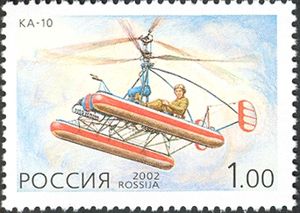Kamov Ka-10
| Ka-10 | |
|---|---|

| |
| Ka-10 on a 2002 Russian stamp | |
| Role | Observation helicopter |
| National origin | Soviet Union |
| Manufacturer | Kamov |
| Designer | Nikolay Kamov |
| First flight | September 1949 |
| Status | Retired |
| Primary user | Soviet Navy |
| Number built | 16 |
The Kamov Ka-10 (NATO reporting name Hat[1]) was a Soviet single-seat observation helicopter that first flew in 1949.
Design and development
The Ka 10 was a development of Nikolay Kamov's earlier Ka-8, which had been successful enough to allow Kamov to set up his own OKB (design bureau) in 1948.[2] The Ka-10 was of similar layout to the Ka-8, with an open steel-tube structure carrying an engine, a pilot's seat and two three-bladed coaxial rotors.[3] It was larger, however, with a revised transmission and rotor hub design, and a new engine specially designed for the helicopter, the 41 kilowatts (55 hp) Ivchenko AI-4 flat-four.[2][4][5]
Operational history
The Ka-10 made its maiden flight in September 1949.[4] Three more prototypes followed, which were evaluated by Soviet Naval Aviation. A Ka-10 was displayed at the 1950 Tushino Air Display, and one made the first landing by a Soviet helicopter on the deck of a ship on 7 December 1950.[2][4]
In 1954, 12 of an improved version, the Ka-10M were built for the Maritime Border Troops. They had a twin tail rather than the single vertical fin of the Ka-10 and modified rotors and control systems.[2][4]
Variants
- Ka-10 : Single-seat observation helicopter.
- Ka-10M : Improved version fitted with twin tailfins and rudders.
Operators
Specifications
Data from The Osprey Encyclopedia of Russian Aircraft 1875–1995[2]
General characteristics
- Crew: one
- Length: 3.70 m (12 ft 1.75 in) (fuselage length)
- Height: 2.5 m (8 ft 2.5 in)
- Empty weight: 234 kg (516 lb)
- Gross weight: 375 kg (827 lb)
- Powerplant: 1 × Ivchenko AI-4V , 41 kW (55 hp)
- Main rotor diameter: 2 × 6.12 m (20 ft 1 in)
- Main rotor area: 58.8 m2 (633 sq ft)
Performance
- Maximum speed: 90 km/h (56 mph, 49 kn)
- Range: 95 km (59 mi, 51 nmi)
- Service ceiling: 1,000 m (3,300 ft)
References
Notes
Bibliography
- Alexander, Jean. Russian Aircraft since 1940. London: Purnell Book Services, 1975. ISBN 978-0-37010-025-8.
- Apostolo, Giorgio. The Illustrated Encyclopedia of Helicopters. New York: Bonanza Books, 1984. ISBN 0-517-439352.
- Gunston, Bill. The Osprey Encyclopedia of Russian Aircraft 1875–1995. London: Osprey, 1995. ISBN 1-85532-405-9.
The initial version of this article was based on material from aviation.ru. It has been released under the GFDL by the copyright holder.
